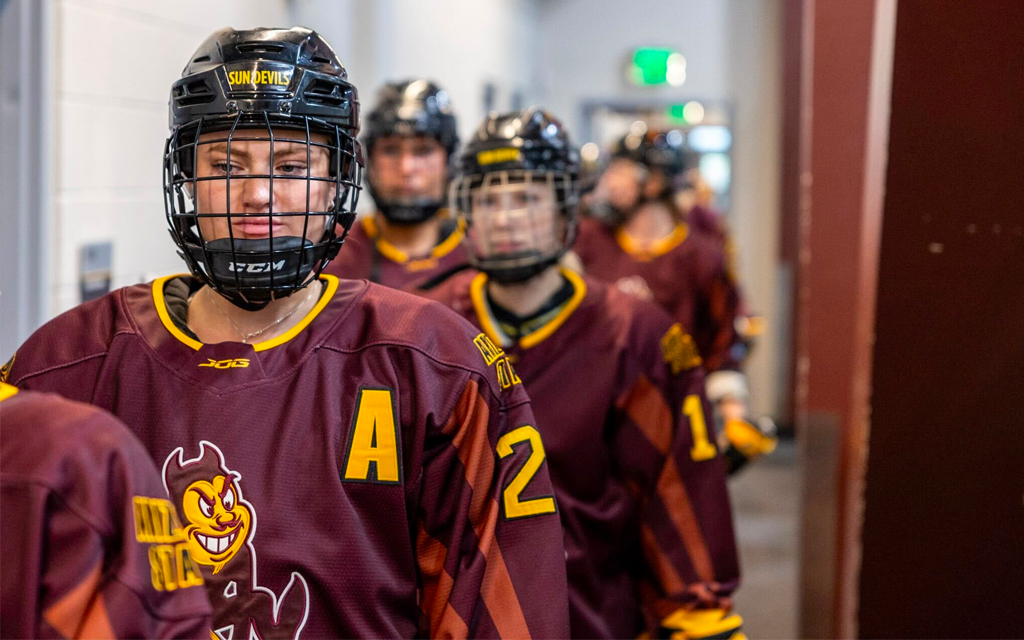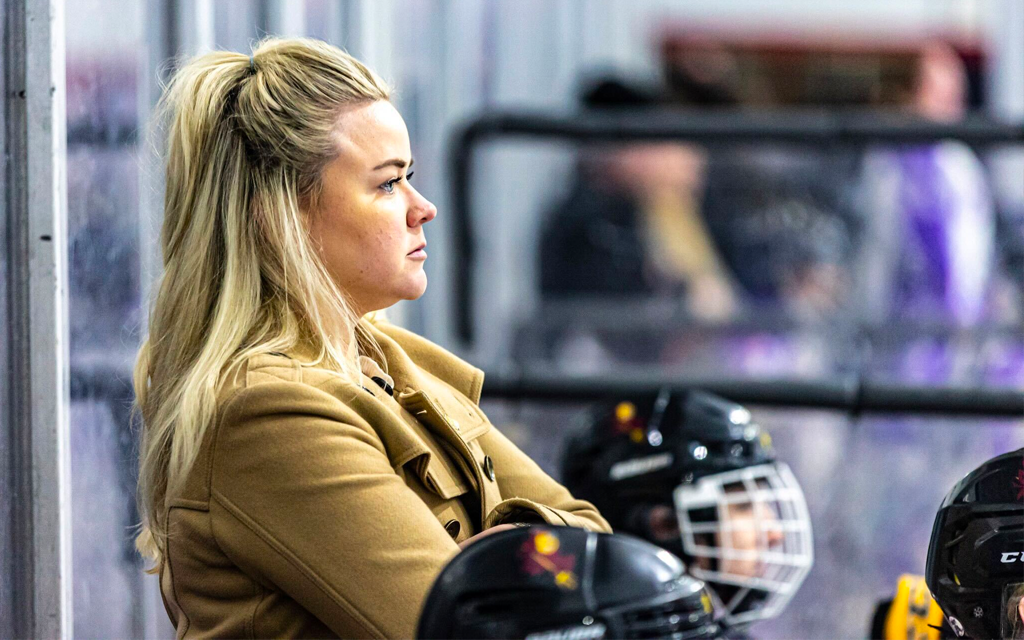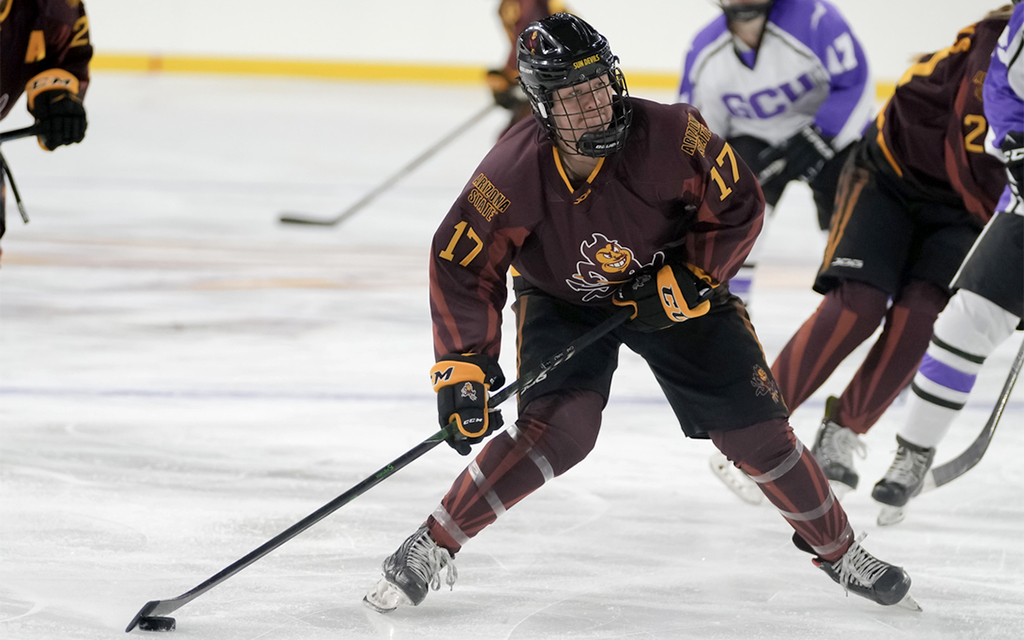
The ASU women’s hockey club team demonstrates their determination to overcome financial hurdles with continued success on and off the ice. (Photo courtesy of Billy Wuneburger)
TEMPE – The sounds of pucks banging off the boards, skates slashing over the ice and fans and teammates cheering when a player slaps a shot into the net can only mean hockey is back at Arizona State’s Mountain America Community Iceplex.
For the ASU’s women’s hockey club team, those are also the sounds of a program experiencing growing pains despite the team’s success last season in the American Collegiate Hockey Association (ACHA).
ASU finally broke through and won the Western Women’s Collegiate Hockey League (WWCHL) championship in 2022-23, which gave it an automatic bye into the ACHA national tournament. It is a feat that escaped the ASU women in the finals the past three seasons.
While the Sun Devils traveled to Boston to compete in the ACHA National Championships last season, it wasn’t without challenges. ASU had to set up a GoFundMe page last year to raise travel money. The good news for ASU is, the campaign exceeded its goal and helped the team make it without worries.
ASU women’s hockey coach Lindsey Ellis has overseen the team since its inception and has struggled to get the school to provide funding. ASU’s women’s hockey squad is a club team, meaning the school doesn’t provide funding like it does for NCAA teams.
“When it comes down to university funding, when you look at the entire season, and what it’s what it costs, we’re spending over $200,000 and relying on the student-athletes to pay that,” Ellis said. “So the university gives us basically 3% of the costs, and we have to cover 97% through the girls.”

ASU women’s hockey players strive for excellence despite facing unique financial challenges. The Sun Devils won the 2022-23 Western Women’s Collegiate Hockey League championship. (Photo courtesy of Billy Wuneburger)
Players usually have to pay for things that the school covers for intercollegiate teams, including travel expenses. And unlike NCAA teams, club teams don’t provide scholarships. Fortunately, most players go through the scholarship portal where they can apply for other funds.
“We do have that aspect of the scholarship portal here at ASU, which is actually very helpful for our girls,” Ellis said. “Luckily, a lot of our girls are good students. So about 85 to 90% of our team is on academic scholarships.”
Unfortunately, though, while these funds might cover some of the expenses, players still must pay other expenses related to the team such as the cost of equipment like sticks, gloves and skates. Outside of that, the players also have to pay for everyday essentials such as food and clothing. It’s even worse for the eight players who hail from Canada, as they have higher expenses moving to a new country. This includes Parksville B.C. native and freshman Bre Powell.
“I worked all summer and was saving up all my money,” Powell said. “I worked full-time from January until the beginning of August. So I kind of saved up my money so I could have money for groceries and that kind of stuff. But I’m fortunate to get some academic scholarships.”
A player like Canadian junior forward Sam Murphy had the option to go to a school in Canada for much less money but chose to attend ASU instead because she decided it was the better choice for her.
“ASU checked all the boxes for me: the school, the hockey, location – everything except the money,” Murphy said. “(That) was the one thing that we were like, ‘That is not something I could fathom paying.’ Going to school within Ontario, especially one in Ottawa or Carleton, would have cost me about $3,000, whereas going to school in Arizona is costing us about $60,000.”
With no funding from the school and the only source of income essentially coming from the players, the team has to make financial cuts that other teams in the ACHA don’t have to worry about. Apparel, equipment and even ice time are luxuries teams at Minot, Adrian and Liberty have that are funded by the schools.
“Sometimes there’s a few times where we have to say, ‘Hey, we’re not practicing on Tuesday,’” Ellis said. “If it’s like a holiday weekend, we don’t want to do that, but unfortunately, when it’s $400 an hour (for ice time), sometimes we have to cut those. We can’t get as much apparel. We can’t offer sticks and all these things that these other programs are getting.”
Even if the team had funding for apparel, the challenge of copyright infringement is present. Club teams at ASU don’t have the licensing rights to use ASU’s official logos, which has been another battle for Ellis as she tries to treat the team like a full-fledged program.
Instead, club teams are often left in the dark by the school about finances. There’s no certainty about how much money clubs will get from the university. For ASU, the question sometimes is now how much money the team will get, but whether it will get any funds at all.
“With the sports club department, you really get nothing,” Ellis explained. “For example, we just presented our budget to them. Last year, we got $13,000, which – for us – doesn’t even cover a month of ice, which is crazy. So when it comes to funding this year, we had to present our budget of $250,000 for this year, and even that number is cutting it close. We don’t know how much we’re going to get. We could get zero. We just don’t know.”
Despite constantly improving each year and being ranked all season in the top 10 in the ACHA, ASU is one of two teams that isn’t funded by the school, which Elis points out is something only the university can address.
“If you look at the top 10 of the ACHA women’s teams, there’s us and the University of Michigan that are the only two teams in the top 10 who are not funded by their university,” Elis said. “That comes down to the sports club departments. So it’s way above my head, unfortunately; we just can’t make that decision.”
ASU is the most expensive team to play for in the ACHA with player fees costing $5,000 due to travel, ice time and other expenses. Ultimately, the fees hurt the team’s chances of recruiting better players and has a trickle-down effect. Better-funded schools can field more talented teams, which leads to more ticket sales – even more reasons for ASU to fund the club.
Recruiting makes a difference. Every league champion since 2001 has been located on the East Coast, with the most western team to win it all being Lindenwood in 2010. In fact, a team west of Missouri hasn’t made it to the finals since the original Arizona State women’s team in 2001.
Now Ellis hopes to end that trend and one day get her team to the ACHA National Championship. The coach has been busy over the summer recruiting 12 new players, aiming to put together a team that can compete with the big names in the division. That includes Powell, who was quickly embraced by her new teammates.

ASU women’s hockey coach Lindsey Ellis devises strategies to ensure the program remains financially stable in order to compete at a high level. (Photo courtesy of Billy Wuneburger)
“The girls are super welcoming and supportive,” Powell said. “I’ve had lots of people who have helped me with moving in and furniture, and we’ve been doing a lot of activities together. So it’s been not horrible. Honestly, I’ve had a really good time so far.”
While the moves on the ice are designed to increase the team’s chances of going far in nationals, some moves off the ice are underway to make sure the team gets funding needed to travel to St. Louis for this year’s tournament.
Ellis put together a golf tournament to raise more money for the team – an event she hopes to make an annual fundraiser.
The golf tournament, which was played last week, drew numerous sponsors from around the Valley and other areas of the country as well, such as companies like Howies Hockey Tape. The event included the golf tournament, dinner and a raffle to help defray the costs for travel, food, ice time and other team-related expenses.
The team wanted an event that would provide a fun time for supporters while addressing an important cause.
“I think we had to raise ($25,000) the month before we went to nationals, which luckily, we were able to do,” Murphy said. “But that’s why we (did) the golf tournament this year, to raise money for the team because we’re player-funded. And the amount of player dues we already pay is expensive. If we were to add more on top of that for something like nationals, I think it would rule out some girls being able to play for the team.”
The event also dropped the puck on a weekend filled with events surrounding Ellis’ team, including two scrimmages against the Arizona Kachinas – the official Tier 1 girls developmental program of the Arizona Coyotes.
Ellis knows that there’s a long road ahead, especially with the team being one of the most expensive to play for in the league, but the donations have helped the team get by for now.
“When it comes to ASU, that’s a structural change,” she said. “That’s not going to happen overnight. I think that’s years and years out. That’s not a change that we know is going to happen soon. But that’s also not our decision. Right now we just have to control what we can control. Luckily we do get a ton of donations which we’re very thankful for and then we have things like our golf tournament, ticket sales and apparel sales.”
For now, the team will try its best to get better each year even with the financial obstacles in the way. Nothing has stopped Ellis and her team before, and she’s determined for nothing to stop them now.
“Right now, we’re focusing on our club’s work because that’s all we can do,” she said.
Despite the success of the golf event, which was well-attended and drew good sponsor support, the team remains short of money. And barring a change in position in how the university funds the club, the ASU women will have to keep trying to win an ACHA National Tournament without a lot of help from the school.

